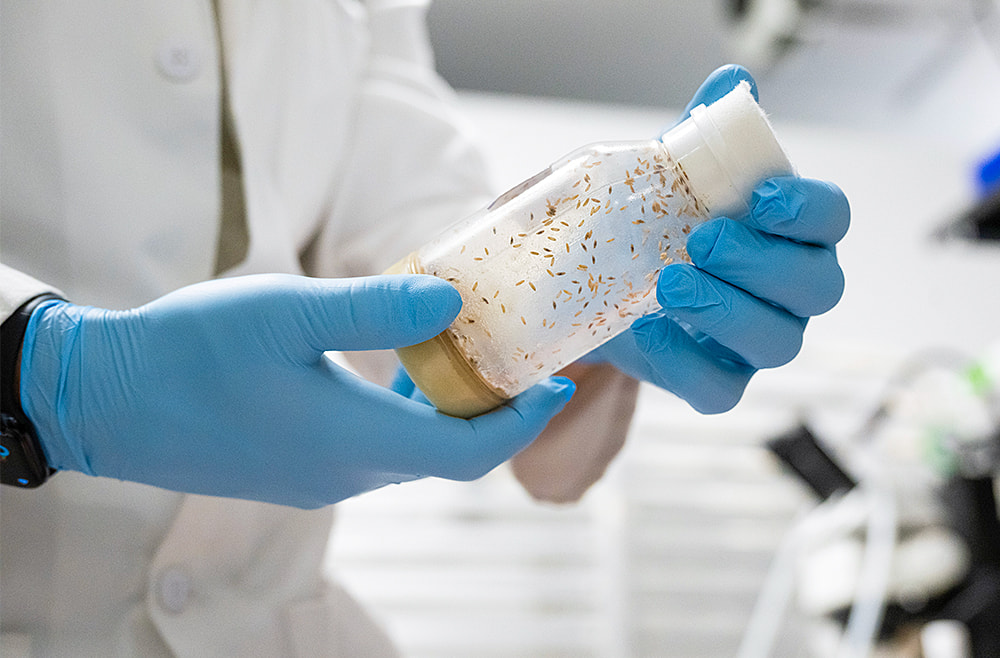“The fruit fly itself is the bioreactor,” explains Matt. “We can take the gene, integrate it into the genome of the fruit fly, grow those fruit flies at large scale with very simple inputs and infrastructure, and then extract and purify that protein out of the insect.”
Fruit flies offer several key advantages as protein factories. They enable low costs through inexpensive feed and simple rearing setups, a far cry from the capital-intensive traditional bioreactors. Scaling production is much easier as well, without the infrastructure and energy demands of scaling steel tanks. Fruit flies also boast high fecundity, reproducing with a mere 11-day journey from egg to adult. Their feed-to-biomass conversion ratios are remarkably efficient, living up to the reputation of the insect biomass that dominates the planet. Rearing them at room temperature further simplifies the process compared to other farmed insects.
But most advantageous is that as a multicellular organism with various specialized cell types, fruit flies open up possibilities to produce complex proteins otherwise unmakeable in legacy systems. “We have basically 200 expression systems in one,” says Matt. “It gives us a lot more tools in our tool kit to make complex proteins.”
This allows Future Fields to serve clients seeking custom proteins too complex for bacteria, yeast or mammalian cells grown in bioreactors. Given that more than 40 per cent of newly approved therapeutics are biologically derived, this has major applications: from basic research to preclinical development of protein-based medicines. Monoclonal antibodies, for instance, which are the basis of numerous treatments, can be particularly complex to manufacture — something Future Fields aims to streamline through specialized cell types like neuron cells present in fruit flies.
The protein production process is conceptually simple: insert the DNA sequence for the desired protein into Drosophila eggs through microinjection, a robust process used for more than 30 years; breed the flies to sufficient biomass using Future Fields’ proprietary rearing system; harvest larvae; then purify out the protein using off-the-shelf downstream solutions compatible with existing processes. This apparent simplicity belies the years of painstaking optimization the Future Fields team has invested to create a truly robust and efficient platform.
Future Fields is now constructing an expanded production facility to increase capacity and meet rigorous quality control standards required for medical products used in research and clinical trials. With 34 employees (70 per cent of them U of A grads) and $18 million raised to date, with an upcoming $10-to-$15 million financing round, the company’s commercial traction is taking flight. New clients are coming on-board: from household-name companies purchasing catalog products to partners engaging Future Fields for contract manufacturing of custom proteins.
“The commercial side is really starting to accelerate,” says Matt. The company maintains close ties with its U of A roots, from informal partnerships with researchers to Mitacs internships for new alumni to the advisory role of Matt’s former PhD supervisor.
What began as an aha moment in a Tim Hortons has hatched into an innovation with vast potential to transform how proteins are made. By turning insects into powerhouse producers, Future Fields is working toward a future where it will be cheaper and faster to manufacture the proteins critical for developing life-saving new therapies.
“Our system can make proteins that are otherwise unmakeable in legacy systems,” Matt emphasizes. “We can fill gaps in technical complexity to enable a whole new range of possibilities.”


We at New Trail welcome your comments. Robust debate and criticism are encouraged, provided it is respectful. We reserve the right to reject comments, images or links that attack ethnicity, nationality, religion, gender or sexual orientation; that include offensive language, threats, spam; are fraudulent or defamatory; infringe on copyright or trademarks; and that just generally aren’t very nice. Discussion is monitored and violation of these guidelines will result in comments being disabled.